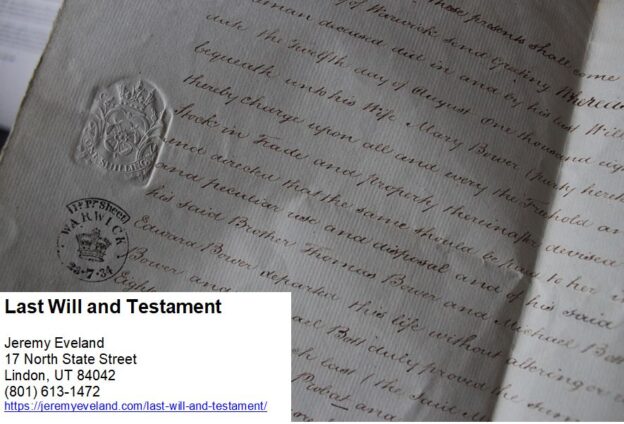When it comes to handling the complex process of probate, one document that carries great significance is the probate affidavit. A probate affidavit serves as a sworn statement, providing essential information regarding the deceased person’s assets, debts, and beneficiaries. By meticulously completing this document, individuals can navigate through the probate process smoothly, ensuring that the wishes of the deceased are respected and their estate is distributed appropriately. In this article, we will explore the significant role that a probate affidavit plays, highlighting its importance and why seeking the assistance of a skilled attorney is crucial for its accurate preparation and successful administration of the probate process.

What is a Probate Affidavit?
A probate affidavit is a legal document that is used in the probate process to provide information about the deceased person, their assets, and the distribution of their estate. It serves as a sworn statement and acts as evidence in court. The probate affidavit plays a crucial role in the probate process, ensuring that the estate is administered correctly and in accordance with the law.
Definition
A probate affidavit is a written statement made under oath by an individual, known as the affiant, who has personal knowledge of the facts stated. It is a legal document used in the probate process to establish and verify various aspects of the deceased person’s estate, such as their heirs, assets, debts, and claims.
Purpose
The purpose of a probate affidavit is to provide a clear and concise account of the deceased person’s estate, facilitating the probate process. It helps in identifying the rightful heirs, determining the distribution of assets, and settling any outstanding debts or claims. By providing accurate and reliable information, a probate affidavit ensures the efficient administration of the estate, minimizing the potential for disputes or legal complications.
Role in the Probate Process
A probate affidavit plays a crucial role in the probate process by providing essential information and documentation necessary for the administration of the estate. It helps establish the identity of the deceased person’s heirs, creditors, and beneficiaries, and ensures that their rights are protected. The probate affidavit serves as evidence in court proceedings, allowing the court to make informed decisions based on accurate and verified information.
Types of Probate Affidavits
There are several types of probate affidavits, each serving a specific purpose in the probate process. Understanding the different types can help ensure that the correct affidavit is used in a given situation.
Affidavit of Heirship
An affidavit of heirship is used to establish the legal heirs of the deceased person. It provides information about the deceased person’s family members, including spouse, children, and other potential heirs. This affidavit is commonly used when there is no will or when the will does not name specific beneficiaries.
Affidavit of Domicile
An affidavit of domicile is used to establish the deceased person’s legal residency at the time of their death. It provides information about their primary residence and can help determine which jurisdiction has authority over the probate proceedings.
Affidavit of Small Estate
An affidavit of small estate is used when the deceased person’s estate is below a certain threshold specified by state law. This affidavit allows for a simplified probate process, bypassing the need for formal probate proceedings. It is often used when the estate consists primarily of personal property rather than real estate.
Affidavit of Death
An affidavit of death certifies the fact of a person’s death. It provides essential information such as the date, time, and place of death, as well as details of the deceased person’s identity.
Affidavit of Collection of Personal Property
An affidavit of collection of personal property is used to claim and collect the deceased person’s personal property, such as bank accounts or other financial assets, without the need for formal probate proceedings. This affidavit is typically used when the value of the personal property is below a certain threshold specified by state law.
Affidavit of Debt and Claim
An affidavit of debt and claim is used to present and verify any outstanding debts or claims against the deceased person’s estate. It provides information about the creditor, the amount owed, and supporting documentation to establish the validity and priority of the claim.
Legal Requirements for a Valid Probate Affidavit
To ensure the validity and enforceability of a probate affidavit, certain legal requirements must be met. These requirements may vary depending on the jurisdiction, but there are some common elements that are typically necessary for a valid probate affidavit.
Competency of the Affiant
The affiant, or the person making the affidavit, must be competent and of legal age to provide a sworn statement. They must have personal knowledge of the facts stated in the affidavit and must be able to clearly attest to their accuracy.
Notarization
In most jurisdictions, a probate affidavit must be notarized to be considered valid. Notarization involves the affiant appearing before a notary public, who verifies the affiant’s identity and witnesses the signing of the affidavit. The notary public then applies their seal or stamp to the document, signifying its authenticity.
Sworn Statements
A probate affidavit must contain sworn statements, which means that the affiant declares, under penalty of perjury, that the information provided in the affidavit is true and accurate to the best of their knowledge. This formal declaration helps ensure the reliability and credibility of the information contained in the affidavit.
Accuracy of Information
A probate affidavit must provide accurate and complete information about the deceased person’s estate, heirs, debts, and claims. It is essential that the affiant verify the information and ensure that it is free from errors or misrepresentations. Any false or misleading information in the probate affidavit can have legal consequences and may invalidate the entire affidavit.
Compliance with State Laws
Each state has its own laws and requirements regarding probate procedures and affidavits. It is crucial to ensure that the probate affidavit complies with the specific laws and regulations of the jurisdiction in which the probate proceedings will take place. Failure to meet these requirements can result in delays, legal challenges, or the invalidation of the probate affidavit.
Process of Creating a Probate Affidavit
Creating a probate affidavit involves several steps, from gathering relevant information to filing the affidavit with the appropriate court. Following a structured process can help ensure that the probate affidavit is accurate, complete, and compliant with legal requirements.
Gathering Relevant Information
Before drafting a probate affidavit, it is important to gather all relevant information about the deceased person and their estate. This includes details about their assets, debts, beneficiaries, and potential heirs. Relevant documents, such as the death certificate, will, and financial records, should be collected and reviewed to ensure accurate representation of the deceased person’s estate.
Drafting the Affidavit
Once all the necessary information has been collected, the probate affidavit can be drafted. It should include a clear and concise statement of facts, providing detailed information about the deceased person, their assets, debts, and claims. The affidavit should be structured in a logical manner, addressing each required element based on the specific type of affidavit being used.
Reviewing and Proofreading
After drafting the probate affidavit, it is crucial to review and proofread the document carefully. This step helps identify any errors, inconsistencies, or missing information that may have been overlooked during the initial drafting process. It is advisable to have a legal professional or an experienced attorney review the affidavit to ensure its accuracy and compliance with legal requirements.
Signing and Notarization
Once the probate affidavit has been reviewed and finalized, it must be signed by the affiant in the presence of a notary public. The notary public will then notarize the affidavit by witnessing the affiant’s signature and applying their seal or stamp to the document. Notarization serves as an official confirmation of the authenticity and validity of the probate affidavit.
Filing the Affidavit
After the probate affidavit has been signed and notarized, it must be filed with the appropriate court. The specific filing requirements and procedures may vary depending on the jurisdiction, so it is essential to familiarize yourself with the rules and regulations of the relevant court. Filing the probate affidavit initiates the probate process and allows the court to review and consider the information provided.
Uses and Benefits of a Probate Affidavit
Probate affidavits offer several uses and benefits in the probate process. Understanding these advantages can help individuals navigate the complexities of estate administration more efficiently.
Avoiding Probate
In some cases, a probate affidavit can be used to bypass formal probate proceedings altogether. For smaller estates or estates consisting primarily of personal property, a simplified probate process may be available, which only requires the filing of a probate affidavit. By avoiding probate, individuals can save time and money that would otherwise be spent on court fees and legal representation.
Expediting the Probate Process
Even when formal probate proceedings are required, utilizing a probate affidavit can help expedite the process. By providing accurate and complete information about the deceased person’s estate, heirs, debts, and claims, a probate affidavit streamlines the court’s review and decision-making process. This can result in a faster resolution of the probate proceedings, allowing the beneficiaries to receive their inheritance more quickly.
Transferring Assets
One of the primary purposes of a probate affidavit is to facilitate the transfer of the deceased person’s assets to their rightful heirs or beneficiaries. By establishing the identity of the heirs or beneficiaries and providing a clear account of the deceased person’s assets, the probate affidavit helps ensure a smooth and efficient transfer process. It minimizes the potential for disputes or challenges regarding asset distribution.
Settling Debts and Claims
A probate affidavit also plays a crucial role in settling any outstanding debts or claims against the deceased person’s estate. By providing a comprehensive list of debts and claims, along with supporting documentation, the probate affidavit helps establish the priority and validity of each claim. This allows the estate to settle its obligations and distribute the remaining assets more effectively.
Streamlining Estate Administration
By providing a comprehensive overview of the deceased person’s estate, a probate affidavit allows for a more streamlined and organized estate administration process. It consolidates all relevant information into a single document, reducing the need for additional paperwork and documentation. This not only saves time and effort but also reduces the potential for errors or discrepancies in the administration of the estate.
Challenging or Contesting a Probate Affidavit
While probate affidavits serve as legal documents and are meant to provide accurate information, they are not immune to challenges or contests. There are situations where individuals may question the validity or accuracy of a probate affidavit.
Grounds for Contesting
Common grounds for contesting a probate affidavit may include allegations of fraud, undue influence, lack of mental capacity of the affiant, or errors or omissions in the provided information. It is essential to consult with an experienced attorney if there are legitimate concerns regarding the probate affidavit’s accuracy, legality, or compliance with legal requirements.
Legal Procedures and Timelines
Challenging a probate affidavit typically involves the initiation of legal proceedings in which the validity of the affidavit is contested. The specific procedures and timelines for contesting a probate affidavit may vary depending on the jurisdiction and the nature of the challenge. It is important to consult with an attorney who specializes in probate and estate litigation to ensure that the appropriate legal steps are taken within the required timeframe.
Evidence and Documentation
To successfully challenge a probate affidavit, the challenger must present compelling evidence and documentation that supports their claim. This may include medical records, financial statements, witness testimonies, or expert opinions. Working closely with an attorney can help ensure that the necessary evidence is gathered and presented effectively in court.

Working with an Attorney for a Probate Affidavit
Given the legal complexities involved in creating and utilizing a probate affidavit, it is highly advisable to work with an experienced attorney. An attorney with expertise in probate law can provide invaluable guidance and representation throughout the probate process.
Importance of Legal Expertise
Probate law can be intricate and varies significantly from state to state. An attorney specializing in probate law possesses the knowledge and expertise to navigate the legal complexities of the probate process. They can ensure that all legal requirements and obligations are met, minimizing the potential for legal challenges or complications.
Choosing the Right Attorney
When selecting an attorney to assist with a probate affidavit, it is important to consider their experience, reputation, and level of expertise in probate law. It is advisable to seek recommendations from trusted sources or consult with professional legal organizations to find an attorney who has a proven track record in handling probate cases.
Attorney’s Role in Preparing and Reviewing
An attorney’s role in relation to a probate affidavit may include assisting with the gathering of relevant information, drafting or reviewing the affidavit, and ensuring its compliance with legal requirements. They can oversee the notarization and filing process, guaranteeing that all necessary steps are taken. An attorney can also provide guidance and advice throughout the probate process, addressing any questions or concerns that may arise.
Guidance Through the Probate Process
Probate can be a complex and overwhelming procedure, particularly for individuals who may not be familiar with the legal aspects involved. An attorney can provide guidance at every stage of the probate process, ensuring that deadlines are met, legal requirements are fulfilled, and potential issues are identified and addressed promptly.
Representation in Court
In the event of a contested probate affidavit or any other dispute arising during the probate process, an attorney can provide representation in court. They can advocate for their client’s interests, present compelling evidence, and argue the case effectively to protect their client’s rights and secure a favorable outcome. Having an attorney by your side can significantly strengthen your position and increase the likelihood of a successful resolution.
Key Differences Between a Probate Affidavit and Will
While both probate affidavits and wills serve important purposes in the estate planning and probate process, there are significant differences between the two in terms of creation, probate procedures, asset distribution, and court involvement.
Creation and Execution
A will is a legal document created by an individual, known as the testator, to specify how their assets should be distributed after their death. It typically requires witnesses and must meet specific legal formalities to be considered valid. On the other hand, a probate affidavit is a sworn statement used to provide information about the deceased person’s estate and does not specify asset distribution.
Probate Process
When a will is created, it generally requires formal probate proceedings to validate and execute the instructions outlined in the will. This involves submitting the will to the court, proving its validity, appointing an executor, and administering the estate according to the will’s provisions. In contrast, a probate affidavit can be used in certain situations to bypass formal probate proceedings, particularly for smaller estates or when simplified probate processes are available.
Distribution of Assets
A will provides clear instructions on how the deceased person’s assets should be distributed among their beneficiaries. The court oversees the distribution process and ensures that the will’s provisions are followed. In contrast, a probate affidavit does not determine the distribution of assets. It is primarily used to provide information about the deceased person’s estate, allowing the court to make decisions based on that information.
Administration and Court Involvement
The administration of a will typically involves court supervision to ensure that the executor fulfills their duties and obligations. The court oversees the probate process, reviews the will, resolves disputes, and ensures that the estate is administered in accordance with the law. With a probate affidavit, court involvement may be limited, especially in cases where the estate qualifies for a simplified probate process. However, the probate affidavit itself may still need to be filed with the court and reviewed.

Common Questions About Probate Affidavits
Probate affidavits can raise questions and uncertainties, particularly for individuals who are not familiar with the probate process. Addressing common questions can help provide clarity and understanding.
When is a probate affidavit necessary?
A probate affidavit is typically necessary in situations where the deceased person’s estate needs to go through the probate process. It is required to provide relevant information about the deceased person’s assets, debts, heirs, and claims. The necessity of a probate affidavit may vary depending on the jurisdiction and the specific circumstances of the estate.
Can a probate affidavit replace a will?
No, a probate affidavit cannot replace a will. A will serves as a legal document that outlines the deceased person’s wishes regarding asset distribution, appointment of guardians, and other important matters. A probate affidavit, on the other hand, provides information about the deceased person’s estate, heirs, debts, and claims, but it does not replace the instructions provided in a will.
What happens if a probate affidavit is contested?
If a probate affidavit is contested, it may lead to legal proceedings in which the validity or accuracy of the affidavit is challenged. The specific consequences and outcomes depend on the nature of the challenge, the strength of the evidence presented, and the decision of the court. It is advisable to consult with an attorney experienced in probate and estate litigation to navigate the contestation process effectively.
How long does it take to complete the probate process with an affidavit?
The time it takes to complete the probate process with a probate affidavit varies depending on several factors, including the complexity of the estate, the presence of disputes or contests, and the efficiency of court processes. In general, utilizing a probate affidavit can expedite the process compared to traditional formal probate proceedings, potentially reducing the time required to administer the estate.
Are there any advantages to using a probate affidavit instead of a full probate process?
Using a probate affidavit instead of a full probate process offers several advantages. It can save time and money by avoiding formal probate proceedings for smaller estates or when simplified probate processes are available. Probate affidavits also enable faster asset distribution, reduce the potential for disputes, and simplify estate administration. However, it is essential to consider the specific circumstances of the estate and consult with an experienced attorney to determine the most appropriate approach.
Conclusion
Probate affidavits play a crucial role in the probate process by providing accurate and reliable information about the deceased person’s estate, heirs, debts, and claims. They streamline estate administration, expedite the distribution of assets, and minimize the potential for disputes or legal complications. Working with an experienced attorney is highly advisable to ensure the validity and compliance of a probate affidavit, as well as to navigate through any challenges or contestations that may arise. By understanding the purpose, types, legal requirements, and processes associated with probate affidavits, individuals can confidently navigate the complexities of the probate process and ensure the smooth administration of their loved one’s estate.


